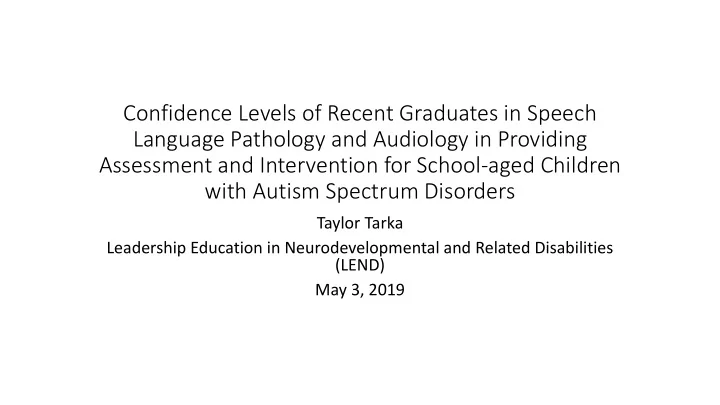

Confidence Levels of Recent Graduates in Speech Language Pathology and Audiology in Providing Assessment and Intervention for School-aged Children with Autism Spectrum Disorders Taylor Tarka Leadership Education in Neurodevelopmental and Related Disabilities (LEND) May 3, 2019
Background • Increased rate for diagnosis of ASD increase demand on practitioners • Increased importance that clinicians have confidence and knowledge • Research indicates that there is a lack of confidence across disciplines • Audiologists and speech language pathologists are some of the first clinicians to treat children with ASD
Purpose Purpose statement: There is a need to update the findings and determine the confidence levels of SLPs and audiologists who are working with school-aged individuals with ASD. • Underlying purpose- To determine if graduate programs are preparing students to work with children with ASD Research Question: What are the confidence levels for SLPs and audiologists, following recent graduation from the University of Connecticut, for providing assessment and intervention for school-aged children with ASD?
Methods • Respondents were recruited via UConn Speech and Hearing Clinic emails provided by the program manager • 21 question, online survey via Survey Monkey • 11 total respondents after exclusion criteria • Follow- up email sent 3 weeks after initial email • Analysis completed in Excel • Main items of interest included; • Confidence levels in overall knowledge of ASD • Confidence levels of assessing children with ASD
Results- Demographics • 11 respondents • 8 SLPs • 3 Audiologists • All 0-5 years post graduation • All currently work with children with ASD • Majority (91%) took a course with ASD as a topic • 75% didn’t feel that taking additional coursework on ASD would have benefitted them • Majority (82%) had the opportunity to assess/treat individuals with ASD in their graduate program
How confident are you in your overall How confident are you in assessing children knowledge of ASD? with ASD? Not at all Not at all 1 1 confident confident Not so confident Not so confident 2 5 Somewhat Somewhat confident confident Very confident Very confident 5 8 Extremely Extremely Confident Confident
How confident are you in determining appropriate How confident are you in counseling the How confident are you in counseling the intervention goals and objectives for children with caregiver of a child who you are concerned may caregiver of a child who has a current ASD? have ASD and should be evaluated for a possible diagnosis of ASD? diagnosis? 1 1 1 1 1 2 Not at all confident Not at all confident Not at all confident 2 Not so confident Not so confident Not so confident Somewhat confident Somewhat confident Somewhat confident 4 4 Very confident Very confident Very confident 5 Extremely Confident 5 Extremely Confident Extremely Confident 6 How confident are you in providing training to How confident are you in delivering effective, How confident are you in collaborating enhance the knowledge and skills of other evidence-based services to children with ASD? with other service delivery professionals professionals who work with children with ASD (i.e., OT, PT, psychologist, etc.) who work (i.e., classroom teachers, paraprofessionals)? with children with ASD? 1 2 2 2 Not at all confident 3 Not at all confident Not at all confident Not so confident Not so confident Not so confident Somewhat confident 1 Somewhat confident 4 Somewhat confident 6 Very confident Very confident Very confident Extremely Confident Extremely Confident Extremely Confident 6 6
Discussion • Despite the majority (91%) who took classes in their graduate program on ASD and 82% who had the opportunity to assess/treat individuals with ASD in their graduate career, confidence levels still varied throughout the respondents • In terms of providing services and determining goals is “somewhat confident” acceptable? • More research is needed on graduate programs • 73% of the respondents were “somewhat comfortable” with overall knowledge of ASD • Future SLPs and audiologists would benefit from a LEND program to enhance education and therefore confidence with working with children with ASD
References American Speech-Language-Hearing Association. (2016). Scope of practice in speech-language pathology [Scope of Practice]. Available from www.asha.org/policy/. Cascella, P. W., & Colella, C. S. (2004). Knowledge of autism spectrum disorders among Connecticut school speech — language pathologists. Focus on Autism and Other Developmental Disabilities, 19 (4), 245-252. Center for Disease Control and Prevention. (2018). Autism Spectrum Disorder (ASD): Data and Statistics. Retrieved from https://www.cdc.gov/ncbddd/autism/data.html. Cloppert, P., & Williams, S. (2005). Evaluating an enigma: What people with autism spectrum disorders and their parents would like audiologists to know. Seminars in Hearing, 26(04),253-258. Egelhoff, K., Whitelaw, G., & Rabidoux, P. (2005). What audiologists need to know about autism spectrum disorders. Seminars in Hearing, 26 (04), 202-209. Plumb, A. M., & Plexico, L. W. (2013). Autism spectrum disorders: Experience, training, and confidence levels of school-based speech-language pathologists. Language Speech and Hearing Services in Schools, 44 (1), 89. Schwartz, H., & Drager, K. D. (2008). Training and knowledge in autism among speech-language pathologists: A survey. Language Speech and Hearing Services in Schools, 39 (1), 66. Yoshinaga-Itano, C., & Thompson, N. (2014). Enhancing the development of infants and toddlers with dual diagnosis of autism spectrum disorder and deafness. Seminars in Speech and Language, 35 (04), 321-330.
Thank you! Any questions?
Recommend
More recommend